- Home
- Patricia McLinn
Sign Off Page 7
Sign Off Read online
Page 7
“Oh, yeah.” His half smile faded. “But it’s more. I wanted the things he had, sure. But I truly wanted to be just like him. He took it all in, yet none of it seemed to touch him. I sensed that as a kid, but it wasn’t until I was out of Cottonwood County, and seeing how some guys reacted to all the chances to screw up your life, that I realized what Tom Burrell was.”
“But he never really left, did he?” Not the way Mike had, finding success far beyond Sherman. And he would leave again, seeking out a new kind of success. As much as he loved ranching, his ambition clearly was in television. “He didn’t finish college, and he’s never gone anywhere else from what I hear. But you made good out there, and you’re not done with that.”
He opened his hands on the steering wheel, holding it with his thumbs.
“I had a reputation in college and the pros for being real level-headed. My folks sure as hell tried to make me that way. But there were times I thought, how could they possibly know what I was facing? Then I’d find myself thinking, ‘What would Tom Burrell do? How would he act if the wife of an agent offered a signing bonus not written up in any contract?’ Then I’d follow the advice Tom never knew he gave me.” He glanced at me. “Weird, huh?”
“I’ve heard weirder. So you dragged me out here because you want to clear your hero’s name?”
“And want to be around you—want to see you in action. To learn.”
His ambition definitely extended beyond Cottonwood County. “Uh-huh.”
He grinned.
That little-boy-caught-but-surely-you-can’t-yell—at-him-because-he’s-so-charming grin. “Okay. And because I always wanted to play Sherlock Holmes. Aren’t we supposed to look for certain things in the best Sherlockian tradition?”
“The old standbys—motive, opportunity and means—could be tough this time, even presuming Redus has been murdered—which is a big presumption.”
He frowned again. If it sounds as if he didn’t pay much attention to the road, that’s true. We’d encountered precisely one pickup since leaving O’Hara Hill. He could have aimed the hood ornament at the center line and it wouldn’t have much mattered. “Because there’s no body?”
“Yup. Without a body or an eye-witness, you don’t know cause of death, so you don’t know who had means. And you don’t know the time of death, so you don’t know who had opportunity.”
“So we’ll focus on motive.”
My turn to frown—and not only at his “we.” “Motive’s the murkiest, least reliable of the three. Lots of people have motive but never lift a gun or serve up arsenic.”
“Uh-huh,” he muttered, his attention diverted to the east side of the road. “We’re passing Tom Burrell’s land now—the Circle B.”
“So is he a high-sider or low-sider?”
“High-side. But that’s no guarantee in ranching these days. That’s why he built up the road plowing and grading company his father started.”
Marty had labeled Mike with the high-siders. Yet he’d said his father had “sold off” their ranch while he’d continued working on a ranch during his summers. And when he’d made money in football, he’d put it back into a ranch. It struck me that there could be a lot about Cottonwood County and its people—perhaps particularly Mike Paycik—I would never understand if I stayed holed up in Sherman all the time. But did I want to learn about them?
The vehicle slowed. “That’s the road to Burrell’s house.”
Road? I saw only deeper black. Then, from the peripheral brightening of the headlights, I saw a goalpost-shaped structure made of logs with a sign swinging from the crossbar. A dirt track led between the vertical posts then made a sharp right and headed down an embankment.
He offered hopefully, “We could see if the light’s on . . .”
I shook my head, but I noted the rest of the route back to Sherman, in case I wanted to follow it in reverse.
Chapter Seven
Monday, I did a “Helping Out” segment.
A local woman got a phone call that she’d won a fabulous vacation to Acapulco. All she had to do was send a check for two hundred dollars to cover taxes, licenses and fees. She was thrilled. It was just the break she and her overworked husband Dwayne needed. She obtained the first passports of their lives.
The tickets never arrived. When she contacted the company in Dallas, a young female voice said they had closed up, but she’d get her money back as soon as possible. Ten minutes later she got a call from a man at the travel company saying none of that was true. The trip would go on as planned, not to worry. Though, if she sent a check for another hundred and fifty dollars it would guarantee the best suite in the luxury hotel.
That’s when Cissy Robins called “Helping Out” at KWMT.
When the Dallas reporter I’d alerted arrived at what turned out to be a room furnished with tables, chairs and telephones, the owner was loading boxes in a van with Arizona plates. The owner claimed it was a misunderstanding, and to show his good faith, he wrote a check to reimburse Cissy—from his personal account, which oddly enough had a lot more in it than the corporate account. The check cleared this morning.
So, Cissy had her money back, the Dallas station had a good local story, the police had another scam artist to process and we had film of the arrest from the Dallas station—by far “Helping Out’s” best package. Monday’s plan was to tape an interview with Cissy to tell our viewers all the good we’d done, then talk to a local travel agent about how consumers could spot bogus offers.
I’d gotten Les Haeburn to give me Diana Stendahl to shoot the story.
Diana was a no-nonsense forty-two-year-old mother of two. After being widowed eight years ago, she got a job as a receptionist at the station then found her niche with the camera.
Not many women work TV cameras. Physical endurance isn’t as important as it was with earlier generations of cameras . . . except at KWMT, where they still use models I hadn’t seen in more than a decade outside of third-world countries. But Diana said that after growing up slinging bales of hay, then toting around two kids, even the monster cameras she’d started on were no chore.
She understood all the gadgetry and technique. Better yet, when I said I wanted a certain mood or shot, she achieved it without insisting on explaining to me how she did it.
I liked her and, until Paycik’s appearance over my shoulder in the library Friday, she’d been the only KWMT staffer to talk to me like a normal person.
I was heading out when I heard my name called in Haeburn’s nasal tones. He was standing with Thurston Fine.
My first reaction was a stab of hope. I’d been lobbying Haeburn to do my own lead-ins live to “Helping Out.” But Fine wanted me nowhere near the anchor’s chair, literally or figuratively. So far he’d won.
My hope quickly bled away—they were standing by the assignment board, and Fine was erasing “Stendahl” from behind my name for this two-hour block.
“Sorry, Elizabeth. Thurston needs Diana. Something’s come up.”
“What?” I demanded.
“Oh, er . . .”
“It’s a story I’ve been working on for some time,” interposed Fine, smoothing a hand over his thick hair.
Jenny, the production assistant who’d had such interesting things to say in the ladies room Friday evening, had told me Fine flew to Denver every month to have his hair cut. He maintained he had a responsibility to his viewers. I tried to imagine a ranch family sitting before the television in a weather-beaten house dwarfed by the land and sky, listening to the news of the vast world, ineffably calmed because Thurston Fine had the right haircut.
“You’ve been working on all your stories for some time, haven’t you?” I asked sweetly. What was this one? A flash that dinosaurs had disappeared?
Color slashed at Fine’s cheekbones, but he didn’t crumble. “It’s a political story. Not your beat.” He sneered as he strode away.
“Les, I don’t—”
“Sorry, Elizabeth,” Haeburn said, no trace of sinc
erity marring his certainty. “You’ll have to find someone else.”
“No one else is available.”
“Then reschedule. You’ll have to learn to do the work in the real world now, where resources are scarce.”
Not the first time he’d delivered a dig about me expecting unlimited resources. And totally inaccurate. Nobody seeing the equipment around here would expect more than the basics. Besides, I had no intention of adding a third category—diva—to the queen and shark contingents, so I’d been on best watch-my-tongue behavior.
But this wasn’t about equipment or resources, this was about Thurston Fine scoring points.
My time, Cissy Robins’ time and the travel agent’s time were all sacrifices on the altar of Fine’s whim. “Les, this is a good story.”
“It’s consumer affairs. I told you, we don’t get much response to that here.”
I gnashed my teeth, and somewhere my old dentist winced. KWMT didn’t get much response to consumer affairs stories because they’d never done consumer affairs stories before I arrived.
“We’ll get response with this story. We should promo it and do spots for ‘Helping Out’ to let viewers know it exists. We’ll get more calls. In fact—”
“No promos. No spots. Not until the viewers show they want this thing.”
Right. Don’t promo something until it’s already popular.
“If we don’t get this today, Les, it’ll be a rush job to get it—”
“It can wait a day.”
“That’s—”
“Elizabeth Danniher, phone call.” A reporter named Walt held up the receiver from my desk. “They say it’s urgent.”
Trying to pin Haeburn in place with my glare, I managed to speak civilly into the phone. “Elizabeth Danniher, may I help you?”
“Yeah, you can get your butt out here.”
“Di—?”
“Don’t say my name.” But my slip didn’t matter, because Haeburn had taken advantage of my distraction to scuttle away. “Get out here now. I’m in the parking lot, ready for that assignment we should be leaving for right now.”
“But—”
“Right now, understand? I got my assignments first thing this morning and haven’t been in touch since. Guess the radio in the Newsmobile’s broken again.”
The Newsmobile, the top of the line of KWMT’s fleet of news vehicles, was actually an aged four-wheel drive. Tinted windows constituted the entirety of its anti-theft devices protecting equipment stashed in it. But then few thieves went for electronics held together by baling wire and duct tape.
Okay, I wouldn’t recognize baling wire from picture wire, but I do know duct tape.
“But Fine—”
“I hear he’s got an assignment on some political reception, but he doesn’t need anybody ’til seven, and my boy’s got a program at school tonight, so it sure won’t be me.”
To score off me, Fine had intended to keep Diana late on a night she didn’t want to be late, the jerk. But Diana had ferreted out the whole thing, well before I’d had any inkling, and had come up with a simple way to sidestep it—be unavailable.
“I’m going to that program,” Diana added. “Even if this ‘Helping Out’ segment’s not done. And it won’t be, unless you get in your car so you can follow me to where Cissy Robins lives. So get your butt out here. Now.”
* * * *
With my mood immeasurably lightened, we got all the film we needed in far less than the two hours allotted. Cissy seemed to feel that the attention compensated for being made a fool of, though she said for the camera, with common-sense pragmatism, that it wouldn’t have compensated if they’d still been out the two hundred dollars.
“You going back to the station?” I asked Diana when we finished with the travel agent shortly before three.
“No, and I’d rather you didn’t either.” She was loading the camera. The best do that as soon as they’ve shot a story, so they’re ready to go if they come across something. “I’m going straight to my next assignment, then home. I don’t want anything to change that, like you mentioning where I’ll be the next two hours.”
“They couldn’t torture it out of me. But, you’ve got a point. Maybe I’ll do some leg work on another story.”
“A ‘Helping Out?’ ” She wound a cord into a neat loop.
“Not exactly.”
Her brown eyes sharpened, but she asked nothing. It was a good thing, because I don’t know how I would have explained that I had looked up the address of Myrna and Roger Johnson last night after Mike dropped me off.
* * * *
The Johnsons lived outside of town, on what locals call a ranchette and Easterners would call a county. I followed the gravel track from the highway, around a pocket of trees, to the house.
The Johnsons’ place reminded me of the Midwest. The house, barn and other buildings were precisely squared to the highway rather than oriented to a view, a stream or an idiosyncrasy. The barn was the bright red more often seen in Wisconsin than Wyoming. And the small white house wallowed in the shade of a quartet of cottonwoods. Beyond a faded green pickup, a basketball hoop stood at attention at the far end of a parking area. The only jarring note was a blackened, empty rectangle—the charred remains of a structure about half the size of a single-car garage.
Following country courtesy, I honked to announce my arrival. A black and buff dog stretched out in the shade raised its head, but made no other move. He was sleek and well-tended, yet for some reason reminded me of the shadow dog at the house I rented.
And I do mean shadow dog. That was still all I’d seen of the animal. At least I hoped it was a dog, since the bowl of leftover burger and bread I’d placed on the stump had been emptied overnight.
At that moment it occurred to me that I might be feeding a coyote. Or a wolf.
Welcome to Wyoming.
Keeping an eye on the Johnsons’ dog, I headed for the back door.
The screen door whined open, and a burly man in his mid-forties emerged, tucking a shirt into the waist of a pair of overalls with the bib flapping down.
“Hey,” he said, hooking one strap. “Thought I heard somebody. What can I do for you?”
This morning at the station, I’d done a quick check. Roger Johnson Senior managed a company that delivered fuel and heating oils around the state. He was active in civic groups, belonged to the local Methodist Church and coached a Little League team his company sponsored.
“Mr. Johnson, my name is Elizabeth Danniher. I’m a reporter at KWMT-TV. I was wondering if I could talk to you about your son.”
It stopped him in mid-stride. His fleshy face sagged as if it had lost its underpinnings.
“Rog . . .” He barely breathed the name.
“Yes, sir. Mrs. Parens said you might be willing to talk to me.”
“Oh. Mrs. Parens.” His eyes rested on my solitary car, then beyond as if searching for a hidden camera van. His head turned to where the dog once more had its head dropped to its paws.
“See that old feller?” His voice sounded raw. I nodded. “He spends every day watching the road, waiting for Rog. Coldest days this winter, we had to wrestle him inside. Then he’d lie by the door, crying.”
I had nothing to say to that. Nothing to heal the hurt. Nothing to pretend I understood its depths.
Roger Johnson Senior hitched his left shoulder and shook his head. “Don’t suppose that’s the sort of thing you want to hear.” He attached the other overall strap. “I got chores to do. You want to trail along, you can.”
I followed, asking him questions I knew he’d want to answer—questions about his son’s life—before I had to ask about his death.
Roger Johnson made a show of cleaning out a stall while he started talking. The barn was unoccupied, with four horses visible through windows that opened on an attached corral.
After one stall, he sat on a bale of hay that protruded into the aisle. I propped myself against a rough wood wall and listened to Roger Junior’s suc
cesses at school, his many friends and his way with animals.
When the account reached last spring, the son’s junior year in high school, the father drifted into silence. It was resigned, ready.
“What was Roger Junior arrested for?”
“Disorderly conduct.” Bewilderment lingered in his voice and eyes. “That was not like Rog. Not like him at all. There were so many odd things, but that might have been the oddest of all.”
“What sort of odd things?”
“He had bruises when we brought him home from . . . from jail. It hurt bad enough he didn’t go to school the next day. He said he’d fallen riding, but he hadn’t said anything before, and Rog never fell from a horse in his life. It would have made me laugh if he’d said it any other time. But he wouldn’t tell us different no matter what his mother and me said to him. Just said he’d forgot to mention it because he was running late to meet his friend.”
“His friend?”
“Frank Claustel. Frank had his daddy’s car, and they were going over to Cody to see a movie. Frank picks him up here, polite as ever, they leave all smiles, and the next thing we know we’re getting a call from the sheriff’s office that Rog’s in jail. We never could get straight how it was the boys weren’t together. Rog only said they’d had a disagreement. Then he said he was real tired and wanted to go to bed. The next day . . . the next day, he left us.”
“Had he had any other run-ins with the law?”
“Never. That boy had not once caused his mother and me a moment’s unrest. Not a moment. That’s why I’ll never understand why he wrote what he did. In the note Myrna found when . . . when she found our boy in the shed. She wasn’t going to show me, but the sheriff said it was evidence, and he asked me about it. Rog said this was the only way. Because he didn’t want to bring shame on us. He couldn’t . . . never . . .” The man’s heavy shoulders heaved with the force of his sob. “My boy.”
I stood across from him. Helpless. Ineffectual. Guilty.
Another sob tore from him. If Rog had known the heartbreak his decision would bring, would whatever shame he foresaw have looked so unbearable?

_preview.jpg) Almost a Bride (Wyoming Wildflowers Book 1)
Almost a Bride (Wyoming Wildflowers Book 1)_preview.jpg) Prelude to a Wedding (The Wedding Series Book 1)
Prelude to a Wedding (The Wedding Series Book 1)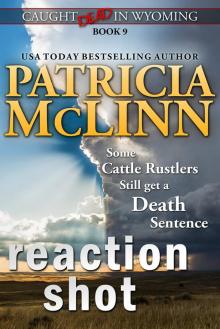 Reaction Shot (Caught Dead in Wyoming, Book 9)
Reaction Shot (Caught Dead in Wyoming, Book 9) Warm Front
Warm Front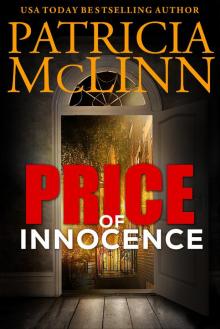 Price of Innocence
Price of Innocence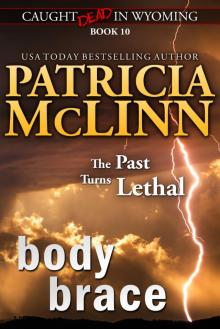 Body Brace (Caught Dead in Wyoming, Book 10)
Body Brace (Caught Dead in Wyoming, Book 10) Death on Covert Circle
Death on Covert Circle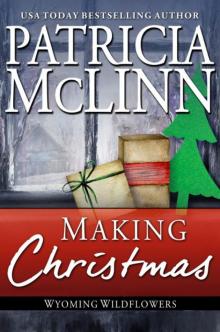 Making Christmas
Making Christmas Death on Torrid Ave.
Death on Torrid Ave.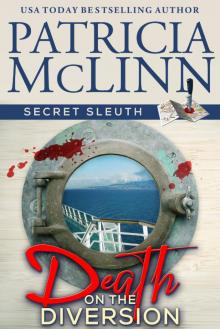 Death on the Diversion
Death on the Diversion The Rancher Meets His Match
The Rancher Meets His Match Widow Woman
Widow Woman The Runaway Bride
The Runaway Bride Hoops
Hoops A Stranger in the Family (Book 1, Bardville, Wyoming Trilogy)
A Stranger in the Family (Book 1, Bardville, Wyoming Trilogy)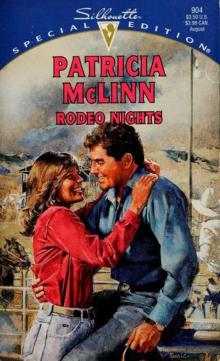 Rodeo Nights
Rodeo Nights Wedding Series Boxed Set (3 Books in 1) (The Wedding Series)
Wedding Series Boxed Set (3 Books in 1) (The Wedding Series)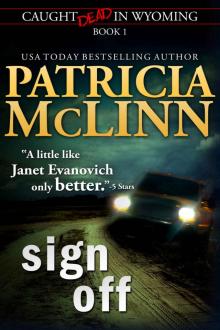 Sign Off (Caught Dead in Wyoming, Book 1)
Sign Off (Caught Dead in Wyoming, Book 1) Prelude to a Wedding
Prelude to a Wedding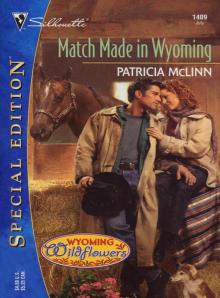 MATCH MADE IN WYOMING
MATCH MADE IN WYOMING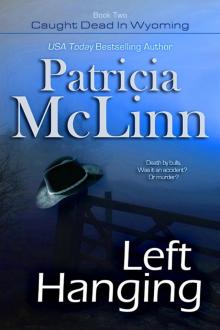 Left Hanging
Left Hanging What Are Friends For?
What Are Friends For?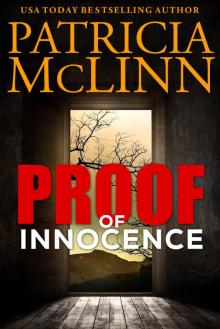 Proof of Innocence
Proof of Innocence Hidden in a Heartbeat (A Place Called Home, Book 3)
Hidden in a Heartbeat (A Place Called Home, Book 3) Baby Blues and Wedding Bells
Baby Blues and Wedding Bells Least Likely Wedding?
Least Likely Wedding? Heart Stealers
Heart Stealers Grady's Wedding
Grady's Wedding Right Brother
Right Brother Wedding of the Century
Wedding of the Century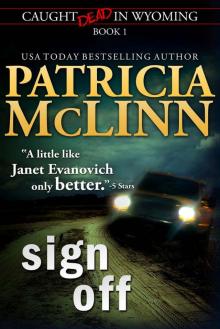 Sign Off
Sign Off The Surprise Princess
The Surprise Princess Wyoming Wildflowers: The Beginning
Wyoming Wildflowers: The Beginning